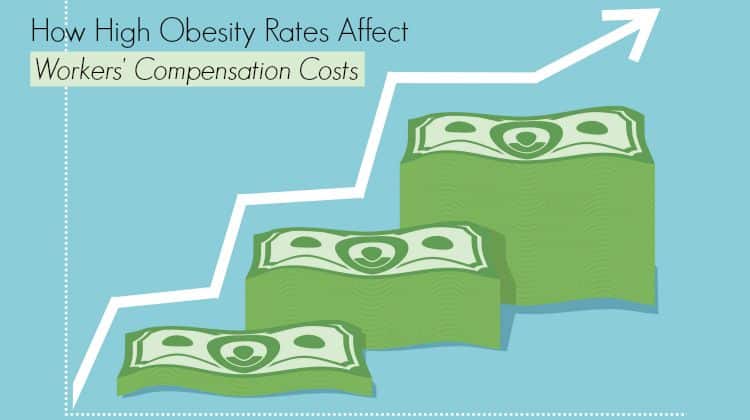
Did you know that workers’ compensation is a significant cost element of the total employee benefit package? Indeed, it is one of only three benefit programs (social security and unemployment insurance) required by law in all the 50 states in the United States. The bigger picture is that high obesity rates are a burden and costly for the organization.
In the United States, employers in all states and territories are required by law to carry insurance under the general term Workers’ Compensation. This form of insurance covers the cost of medical care and rehabilitation for workers injured on the job. It also compensates them for lost wages and provides death benefits for their dependents if they are killed in work-related accidents, including terrorist attacks. Consequently, the high obesity rates have been linked to lower productivity and high compensation claims.
In the United States, high obesity rates are viewed as an epidemic with associated high health care costs. A recent edition of Forbes Magazine included information about a case study conducted by students from the University of North Carolina, which found that a population’s greater access to Wal-Mart, “was associated with lower body-mass indexes and a lower probability of being obese.” The conclusion is that consumers buy healthier foods when their purchasing power increases. However, the high obesity rates are a liability and a burden to the organization when it comes to compensation claims.
The Correlation between BMI and Workers’ Compensation Costs
So what exactly is Body Mass Index (BMI) and how does it relate to high obesity rates and workers’ compensation costs?
BMI is a number calculated from a person’s weight and height. It provides a reliable indicator of body fatness for most people and is used to screen for weight categories that may lead to health problems. BMI is a widely used diagnostic tool to determine weight problems within a population, and is calculated as weight in kilograms divided by height in meters squared. Most search engines will find sites that can calculate it for you.
In April 2007, a team of medical researchers at Duke University published a remarkable study relating obesity in the workplace to the number of worker’s compensation claims submitted by employees, and the results were startling. Over a period of 8 years involving more than 50,000 employees, the researchers were able to correlate BMI to the number of workers’ compensation claims and the dollar costs to a company. They discovered that there is a linear correlation between BMI and the cost of workers compensation claims. For instance, employees whose BMI measured greater than 40 had 11.65 claims per 100 full time employees, while recommended-weight employees had only 5.80 claims.
Consequently, when calculating lost work days, the researchers determined that the effect on lost work days was 183.63 for obese employees versus 14.19 for healthy employees. Furthermore, when calculating medical claim costs, the researchers discovered that the medical claims, costs $51,091 per 100 obese full-time employees versus $7, 500 per 100 non-obese full-time employees.
Clearly, high obesity rates have a negative impact on the organization when it comes to compensation claims.
Navigating the Workers Compensation Challenge
Over time, workers compensation has evolved into a complex mosaic of rules and regulations that vex the best of HR, compensation, and benefit managers, especially in multinational organizations. It also exasperates CEOs and CFOs who must budget for and pay additional premiums and expenses to workers compensation insurance carriers that cover the employees.
In 1982, Workers Compensation cost the US $22.8 billion. In 2002, the costs rose to $72.9 billion, while in 2006, the costs again increased significantly to $87.6 billion (Forbes, 2013).
Therefore, in the absence of a sensible national health care policy, health benefit costs in the United States will continue to increase resulting in higher costs to employees and employers and lower returns on investments and shareholders for companies. I believe that as more and more empirical research on the high obesity rate and its impact on business and society become available, it presents an opportunity for company leaders to incent its employees to achieve and maintain an ideal body-mass index and weight.
These can be supported by the dozens of available individual diet plans and weight loss programs. Therefore, if a company wishes to address its ever-increasing, unsustainable health care costs, studies like the one conducted at the Duke University will be of vital importance in implementing and justifying corporate support for a healthy workforce.
About the Author
Petronila Smith is a writer for CakeHR, an HR software company.